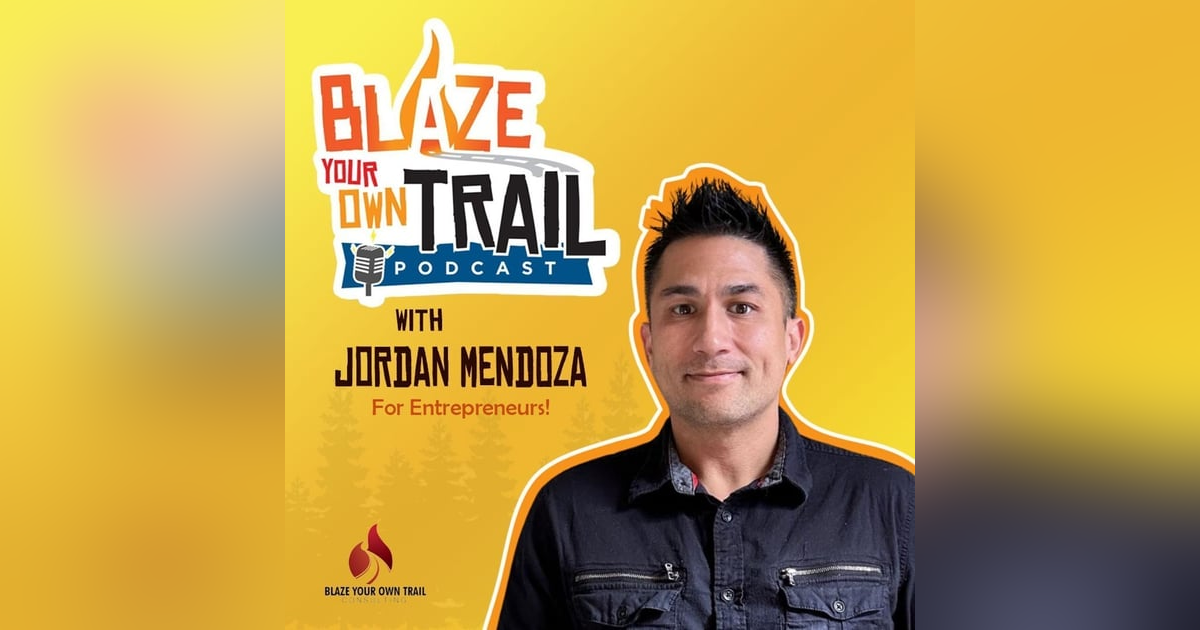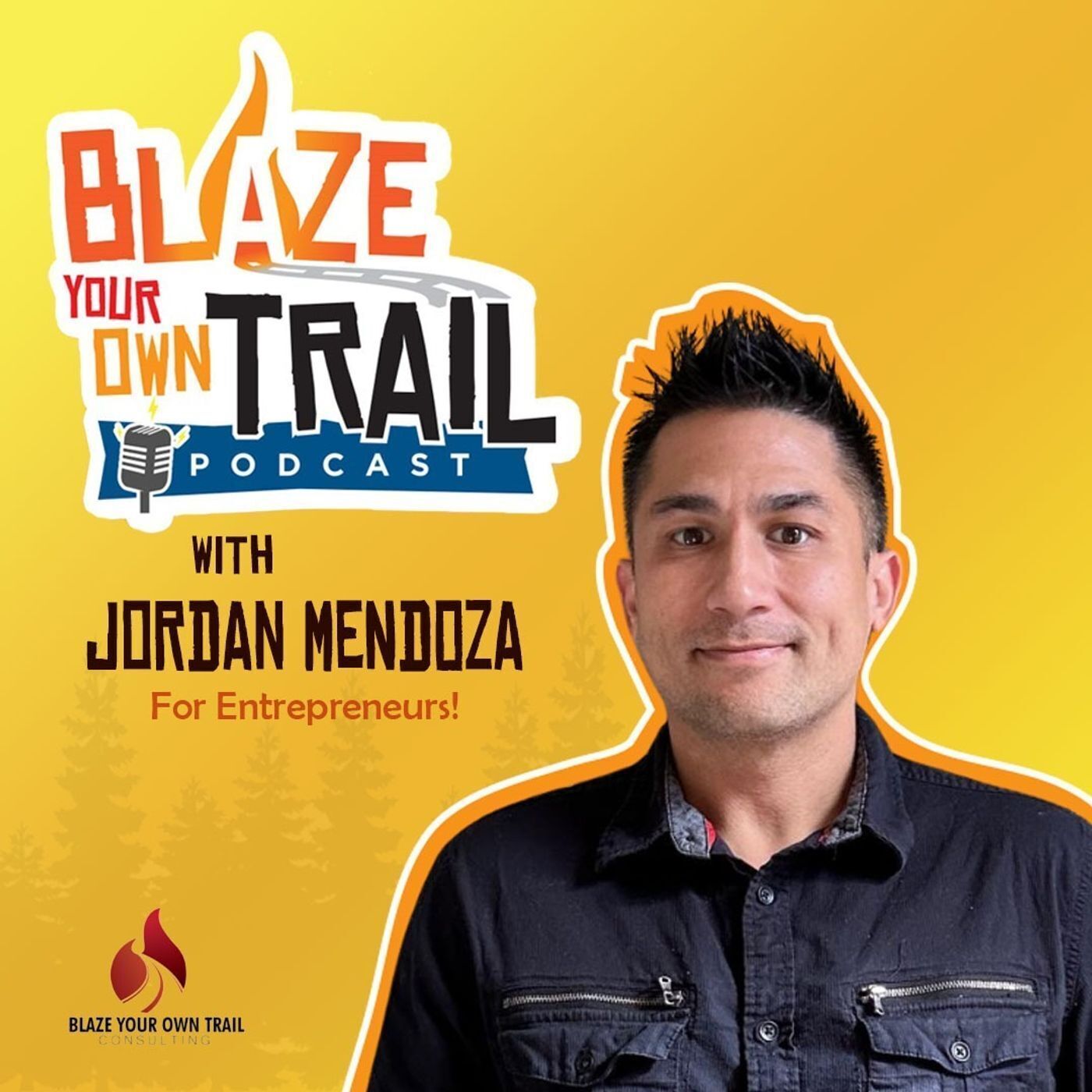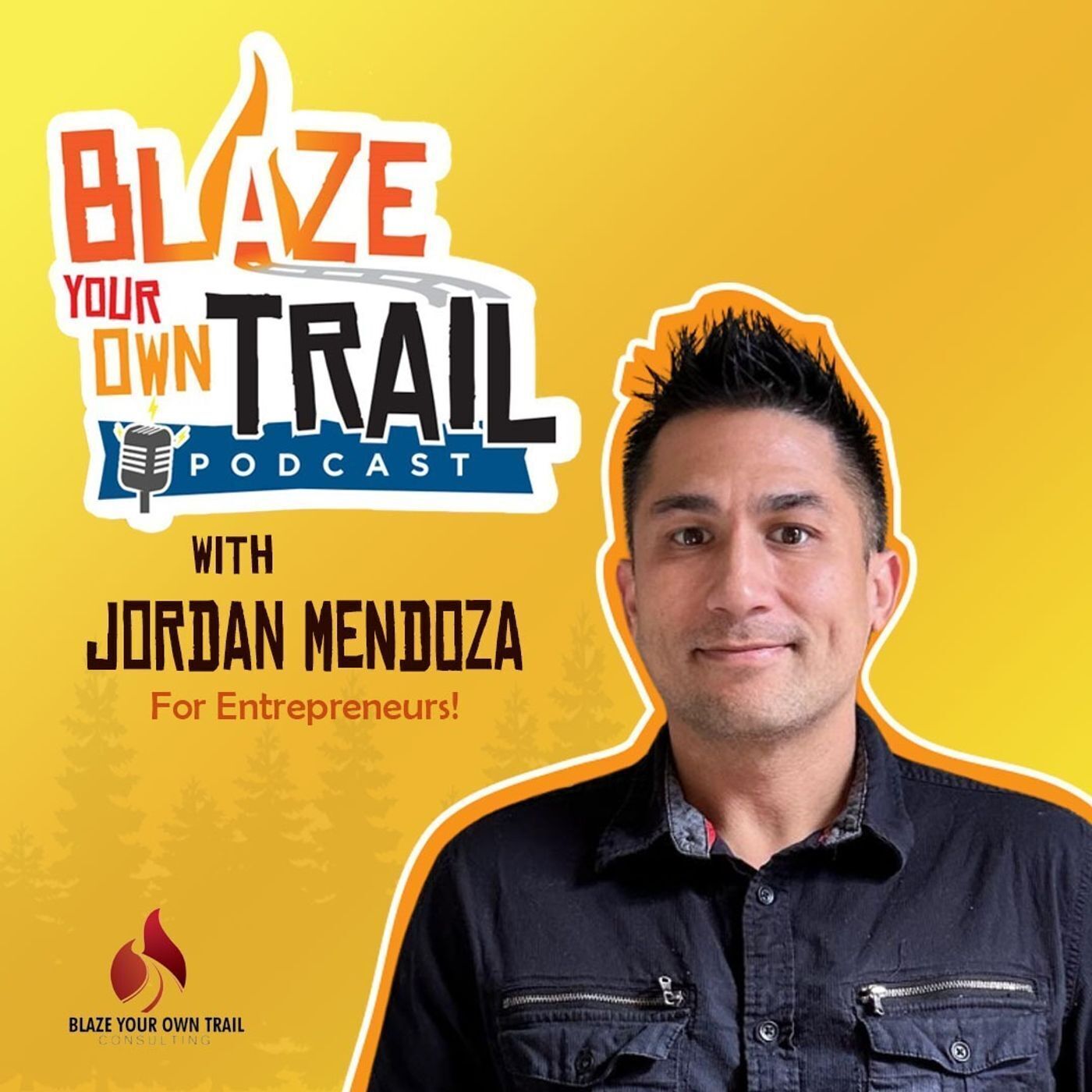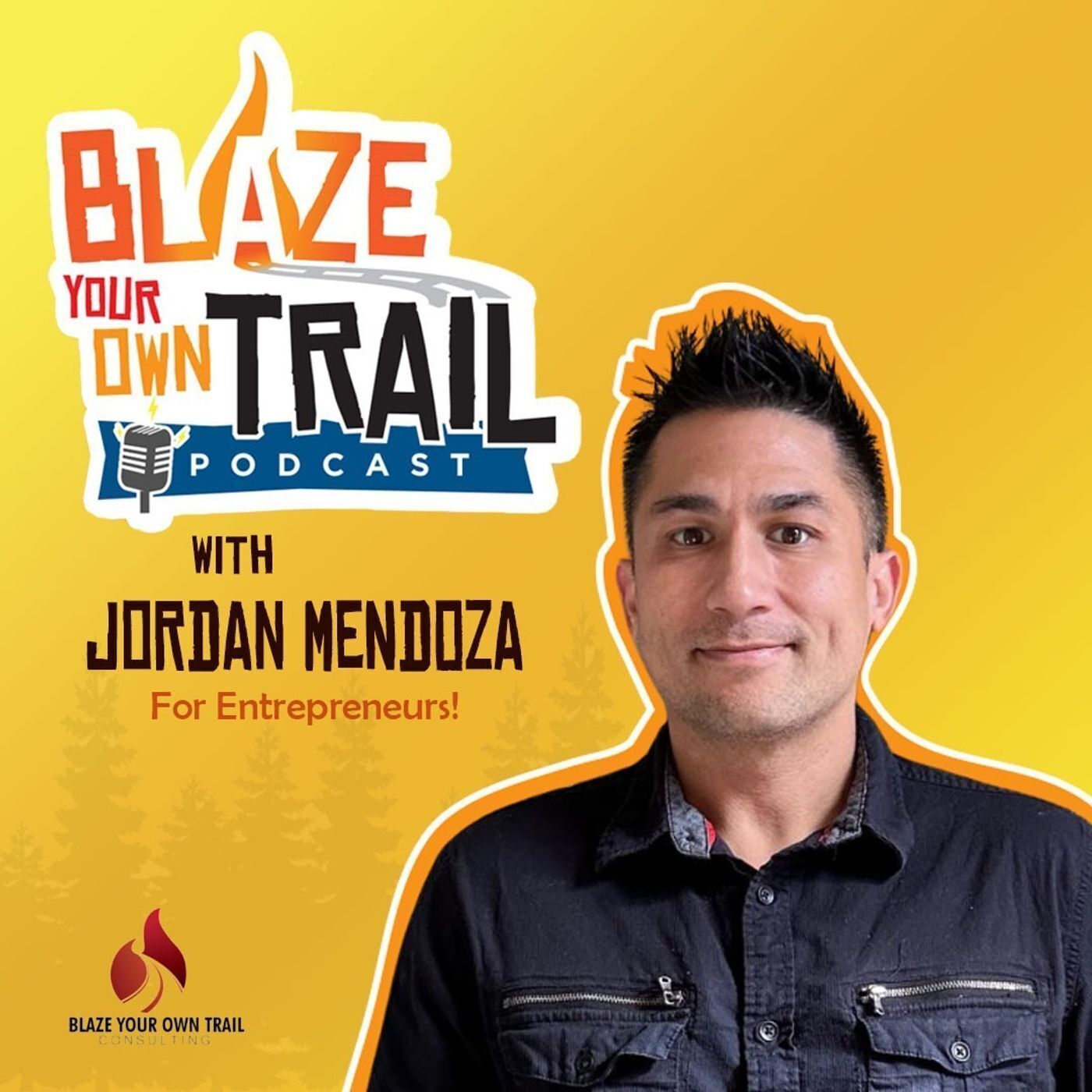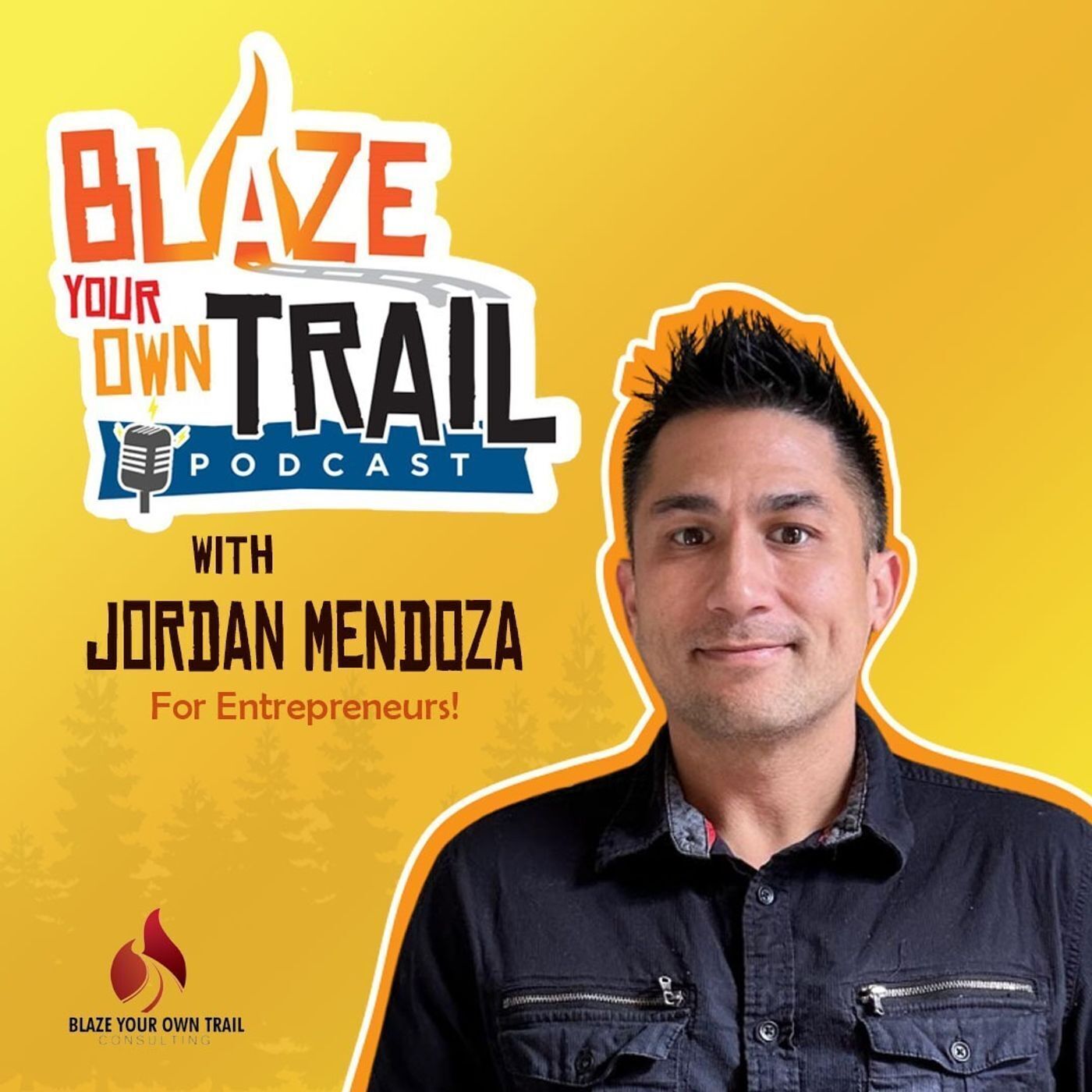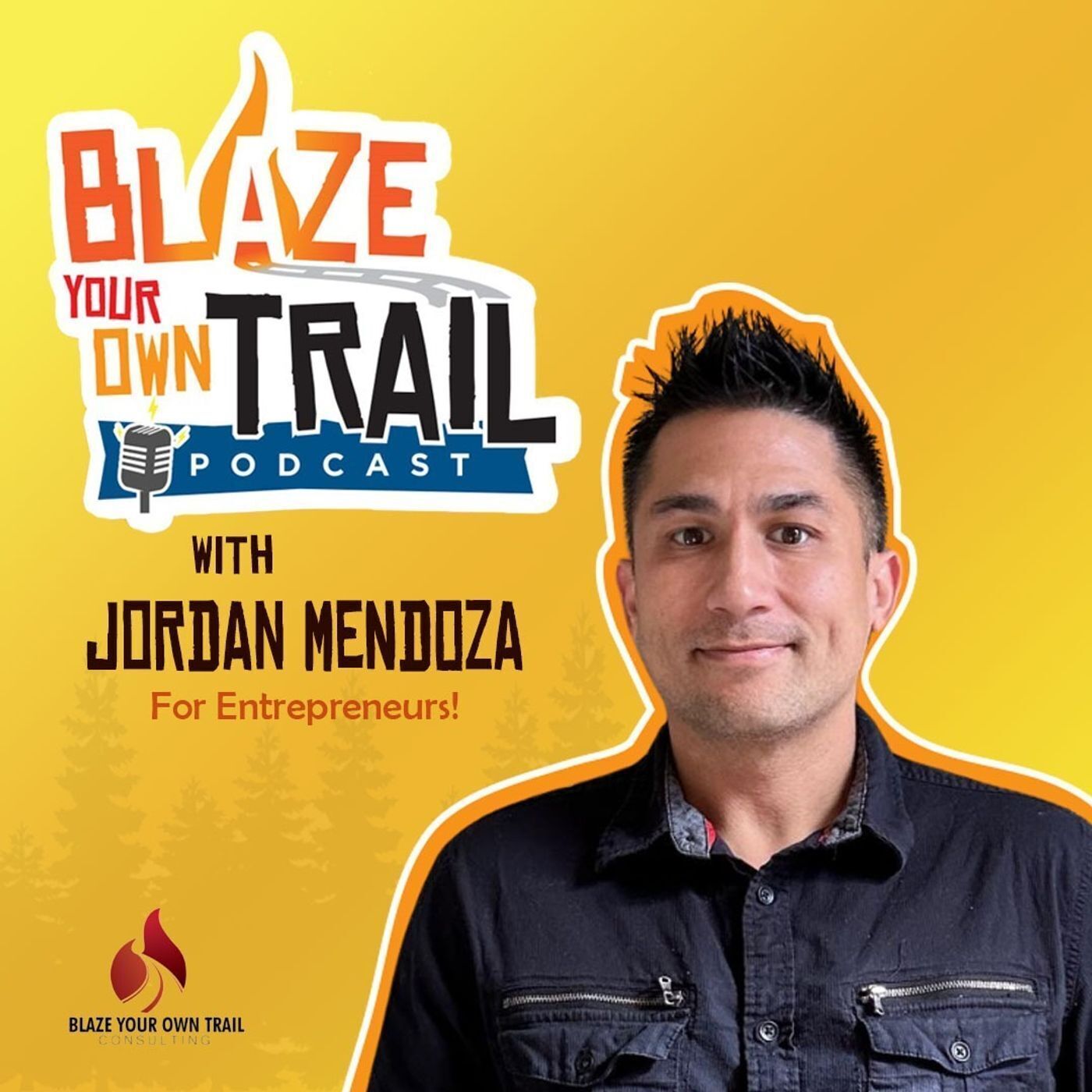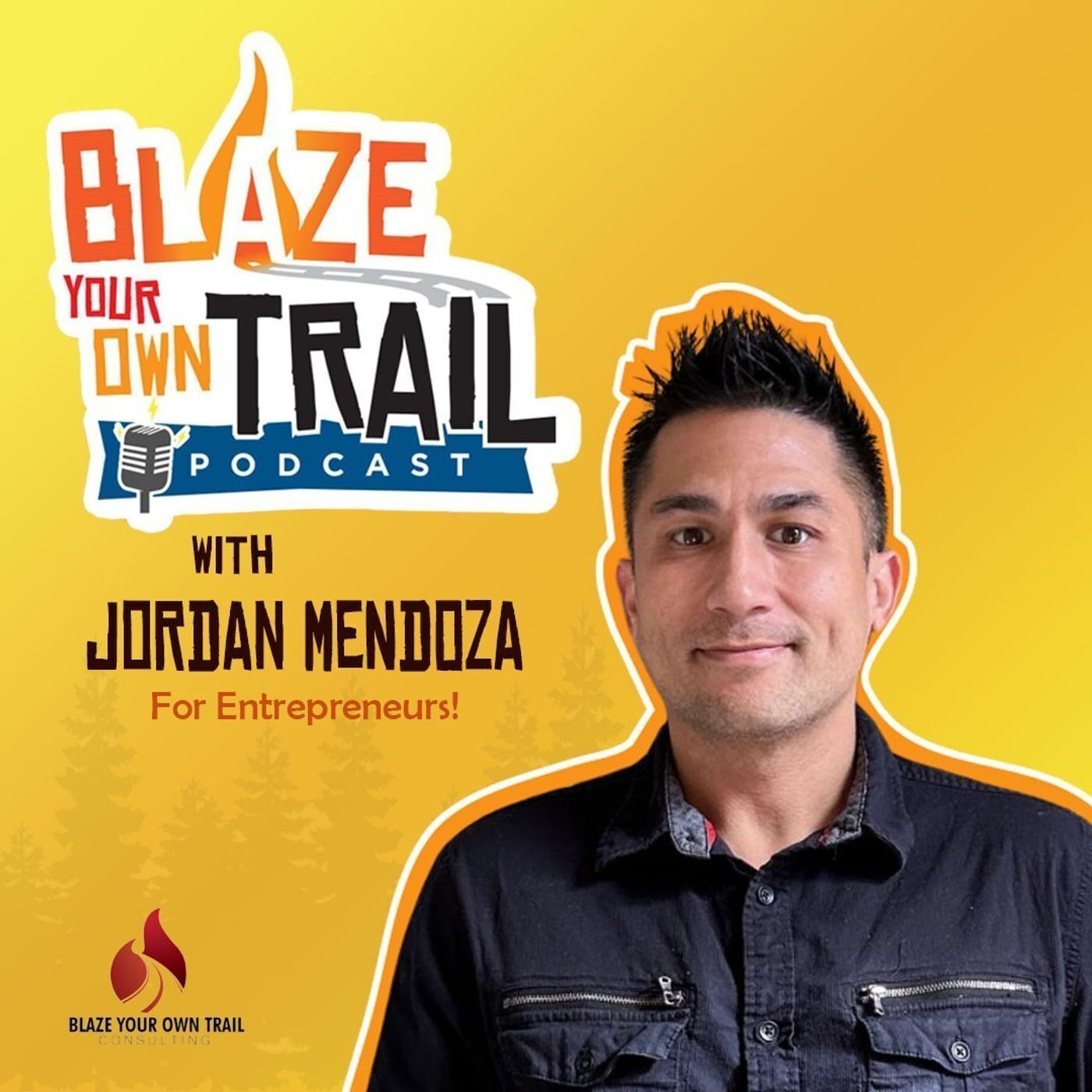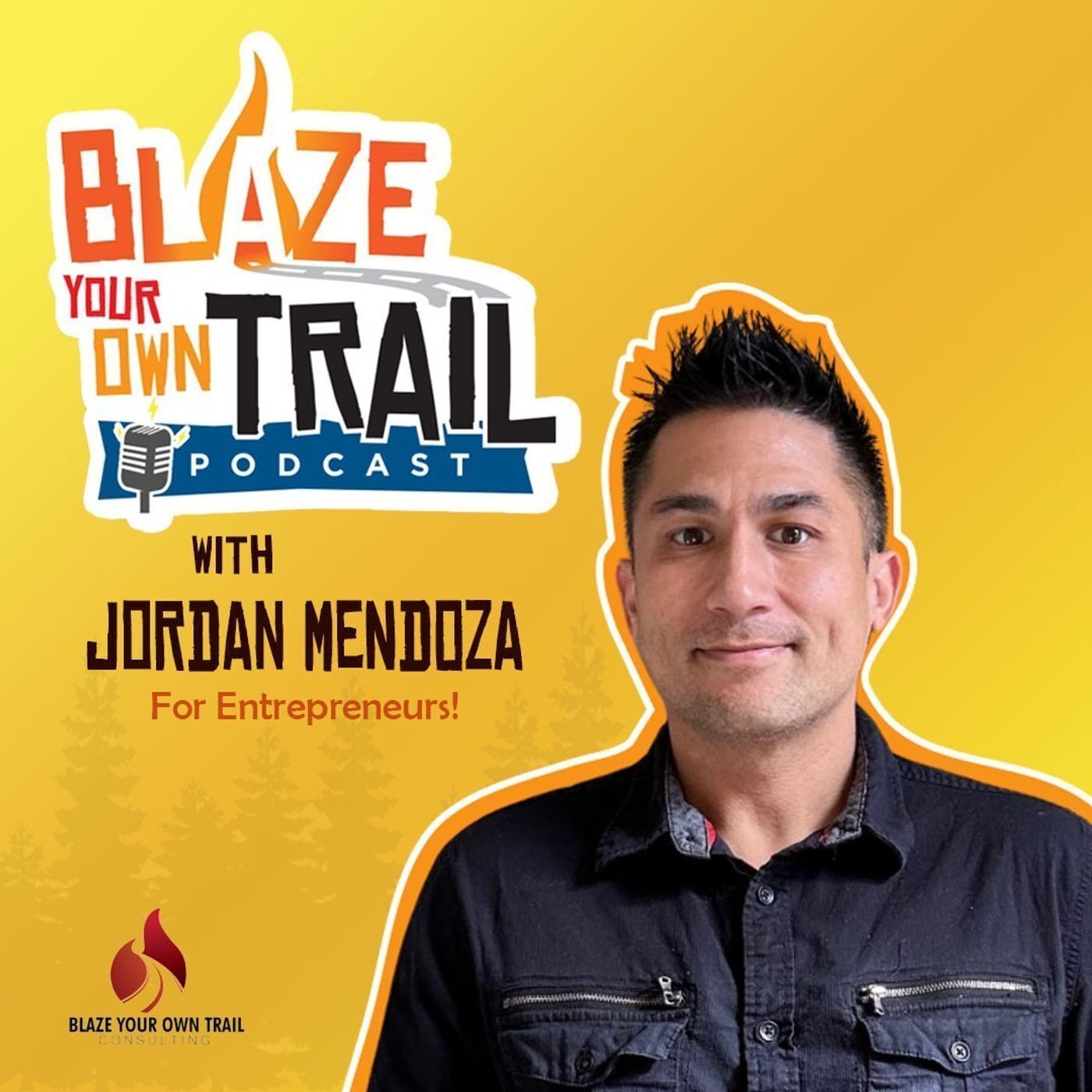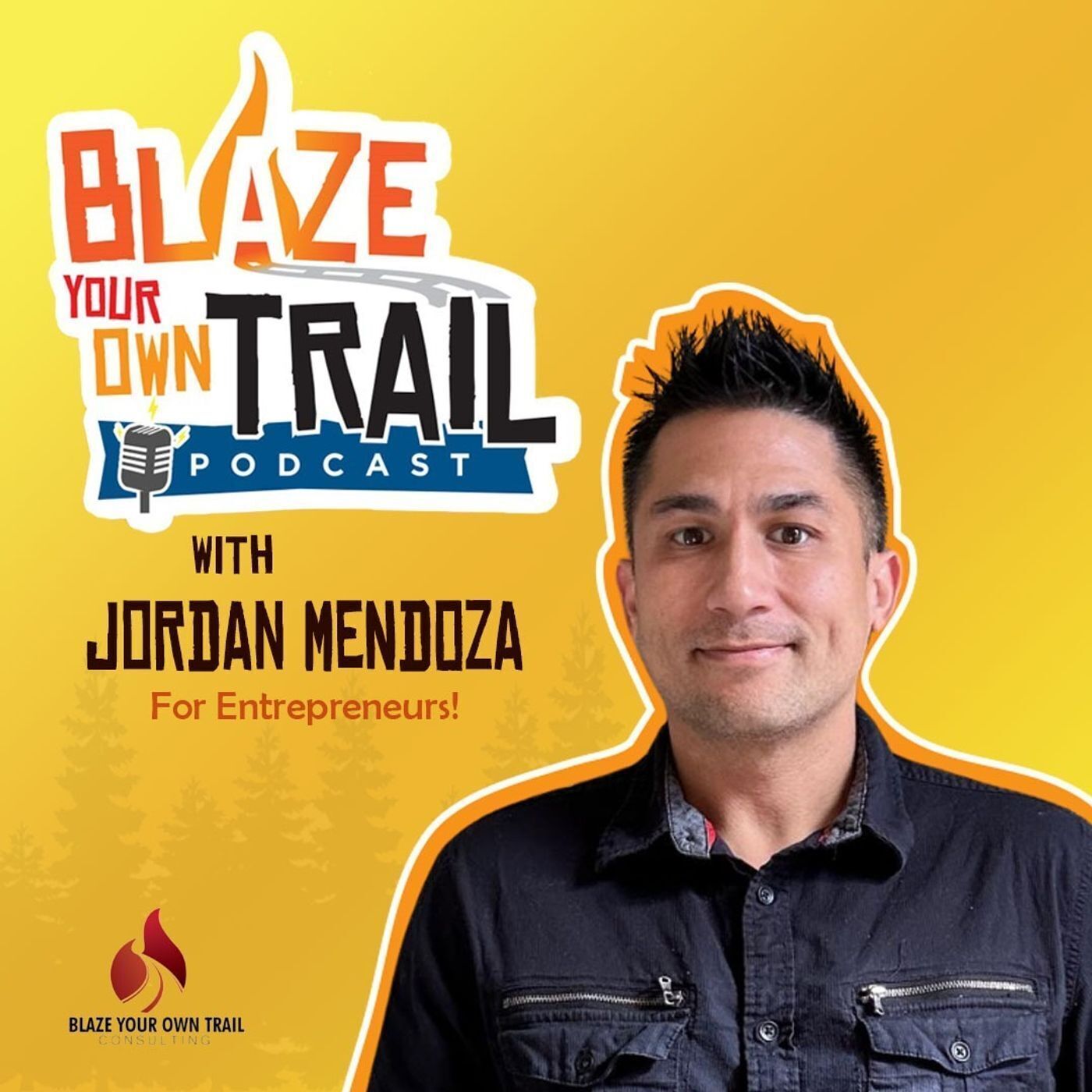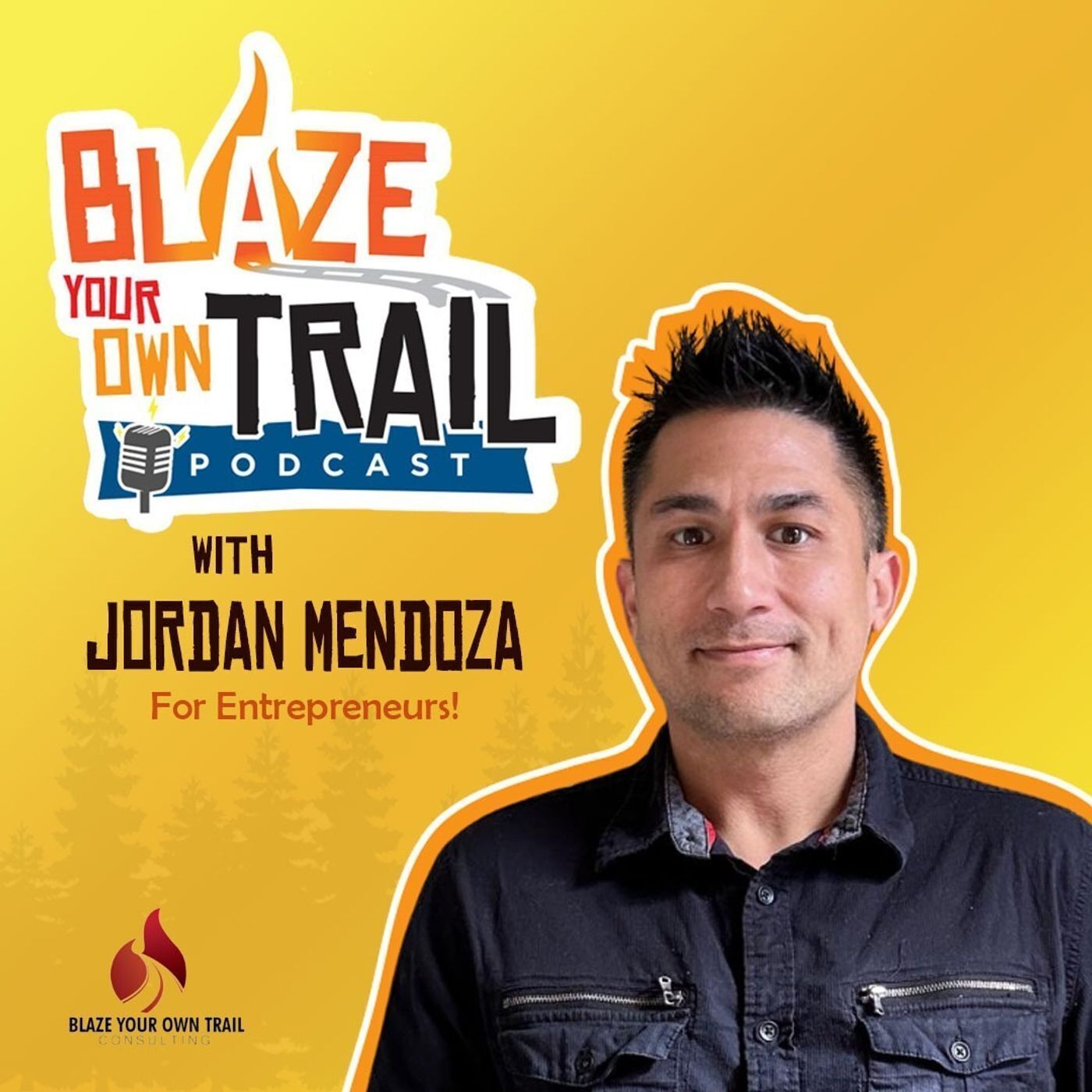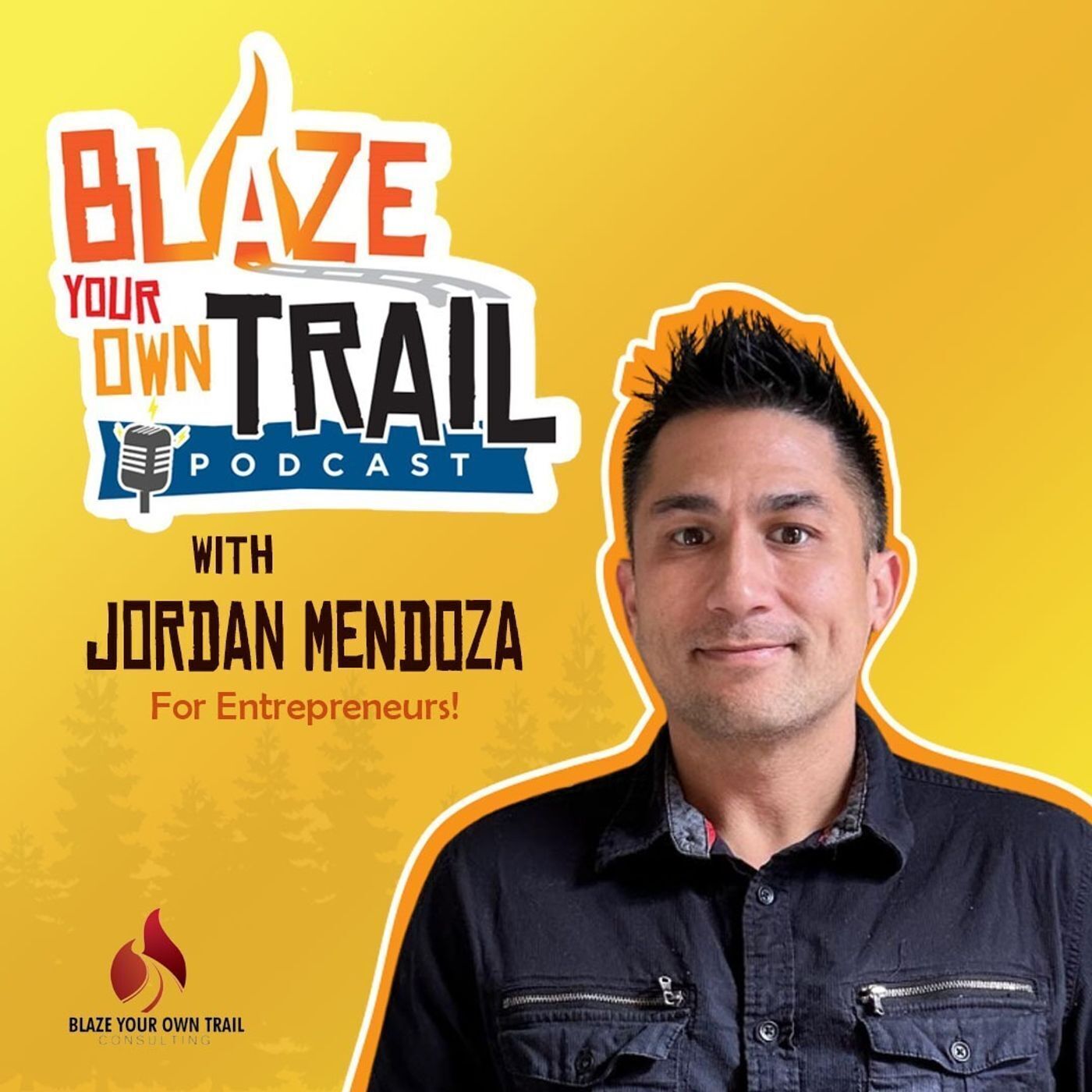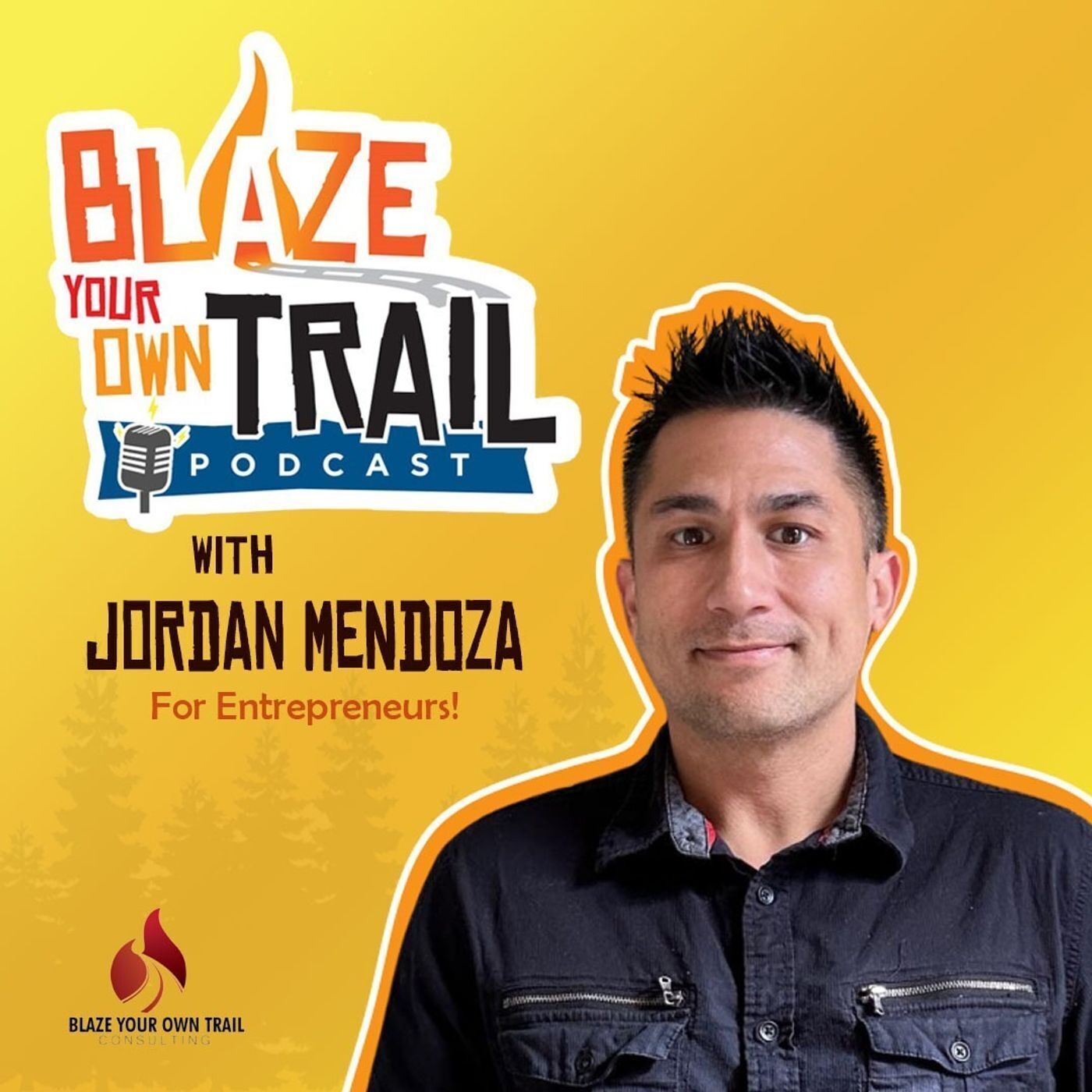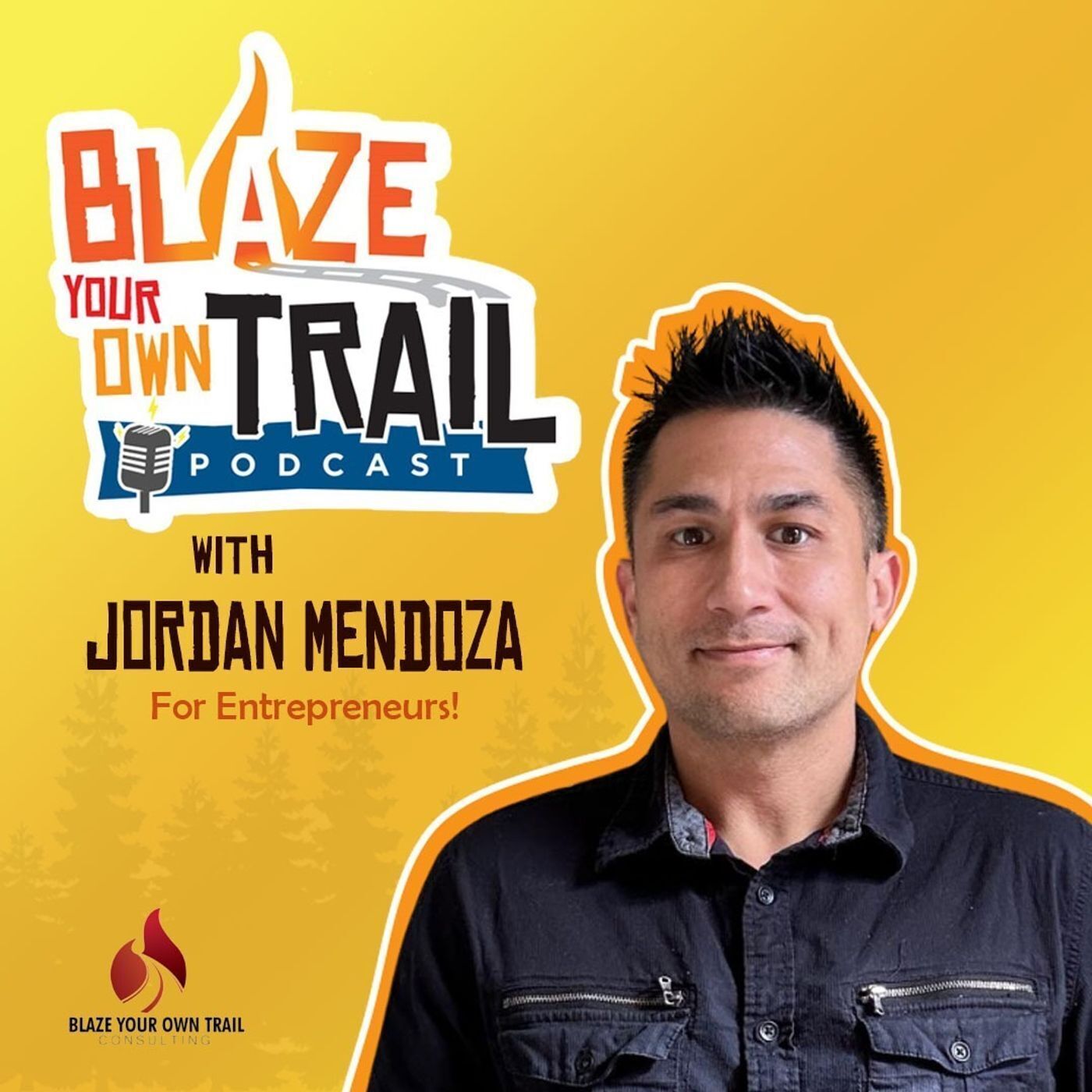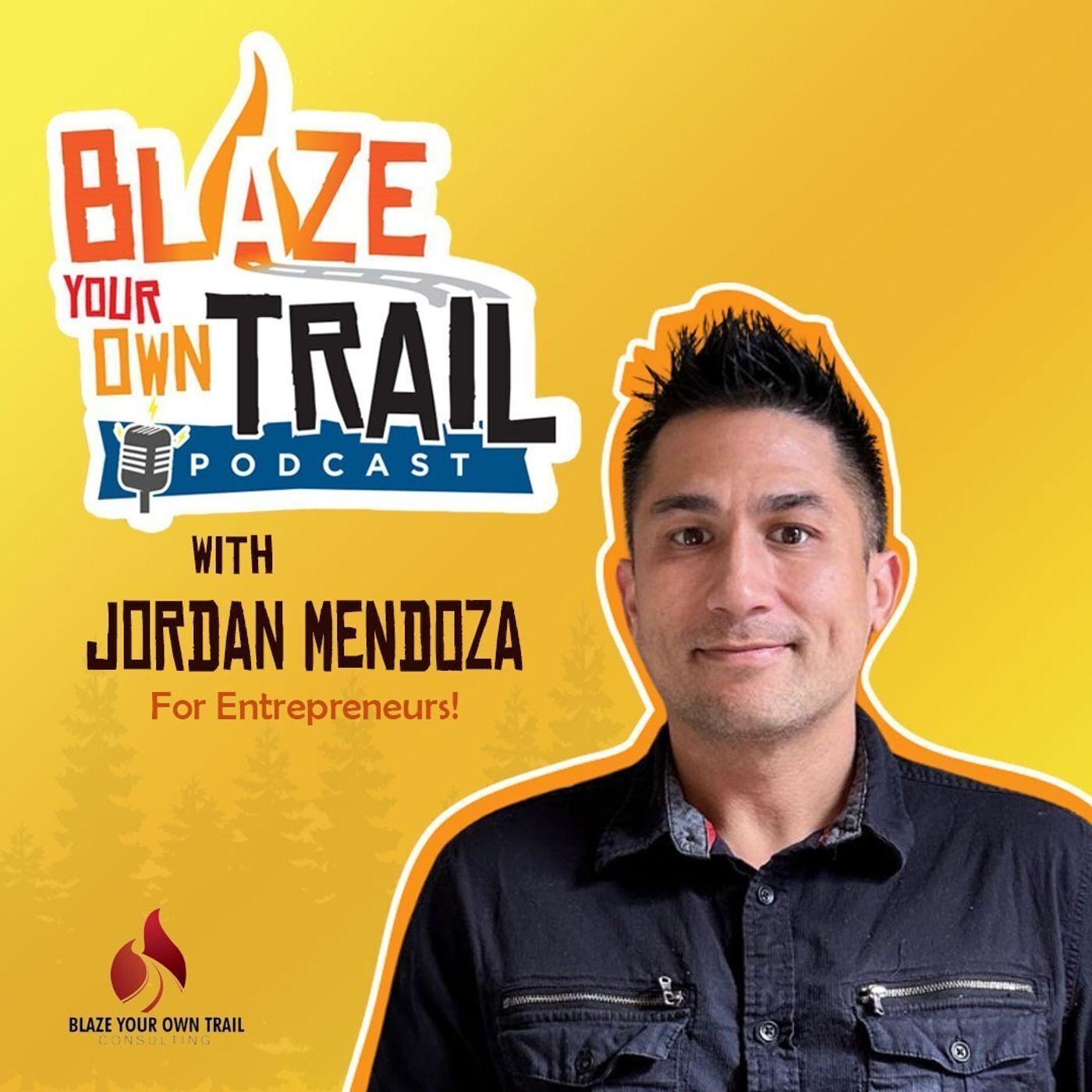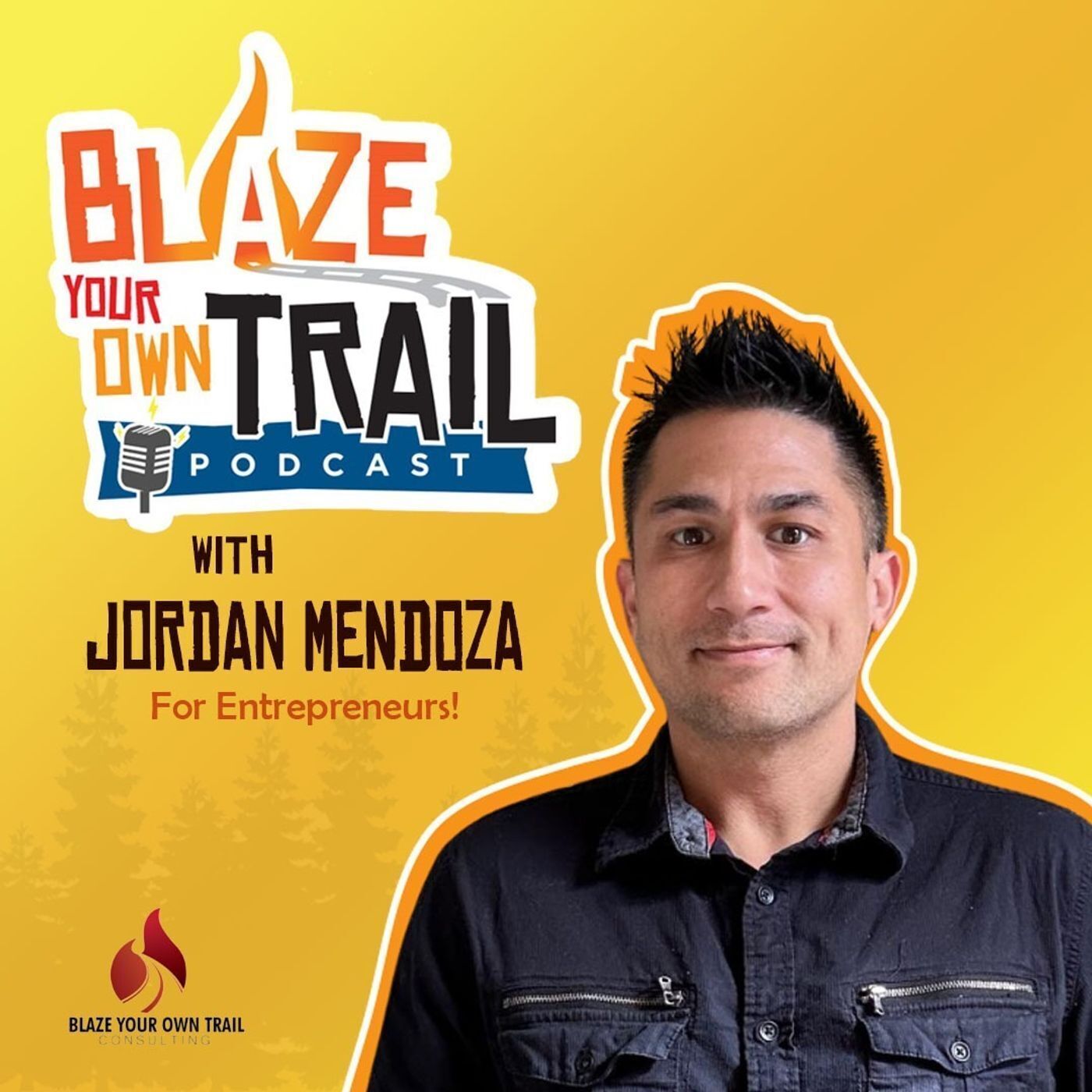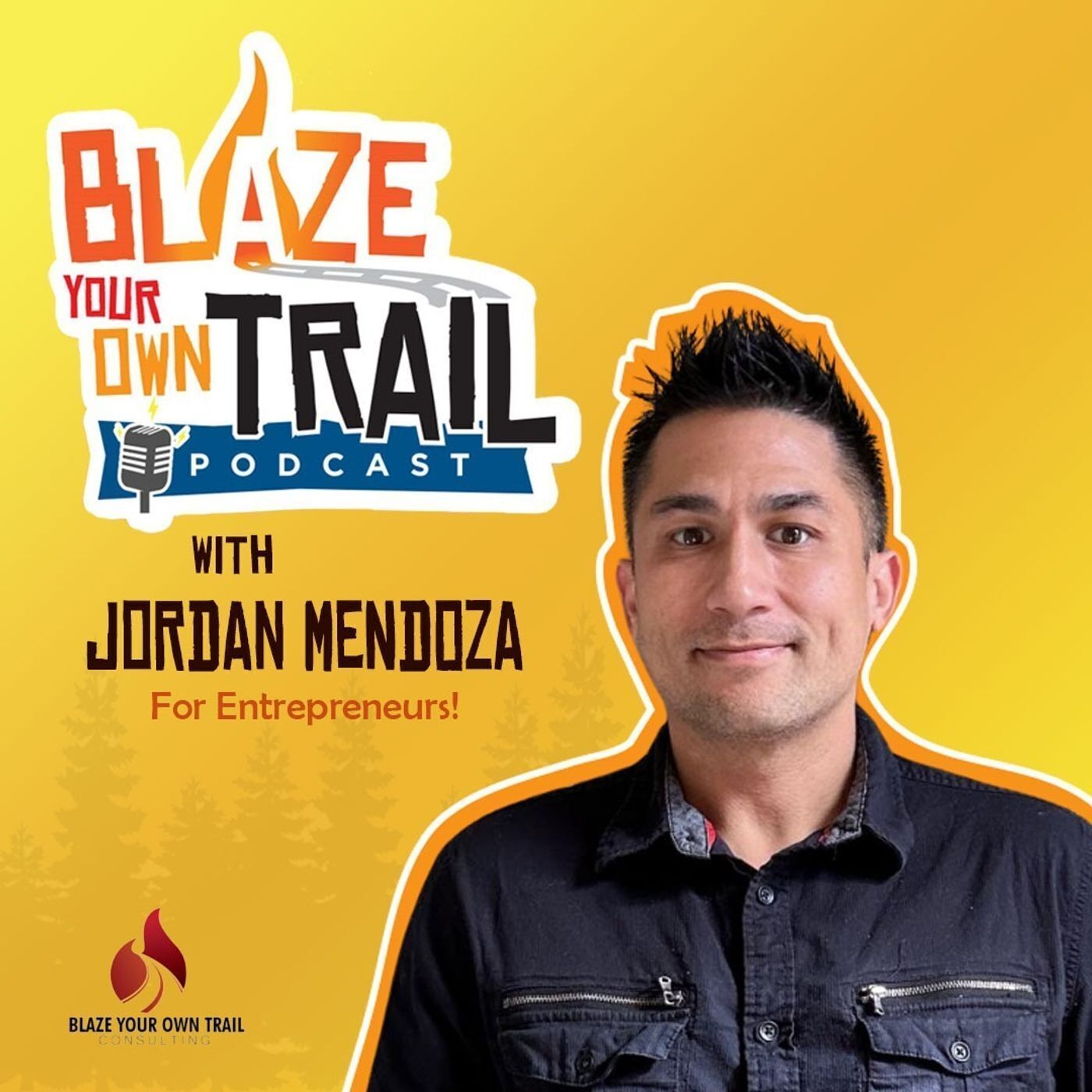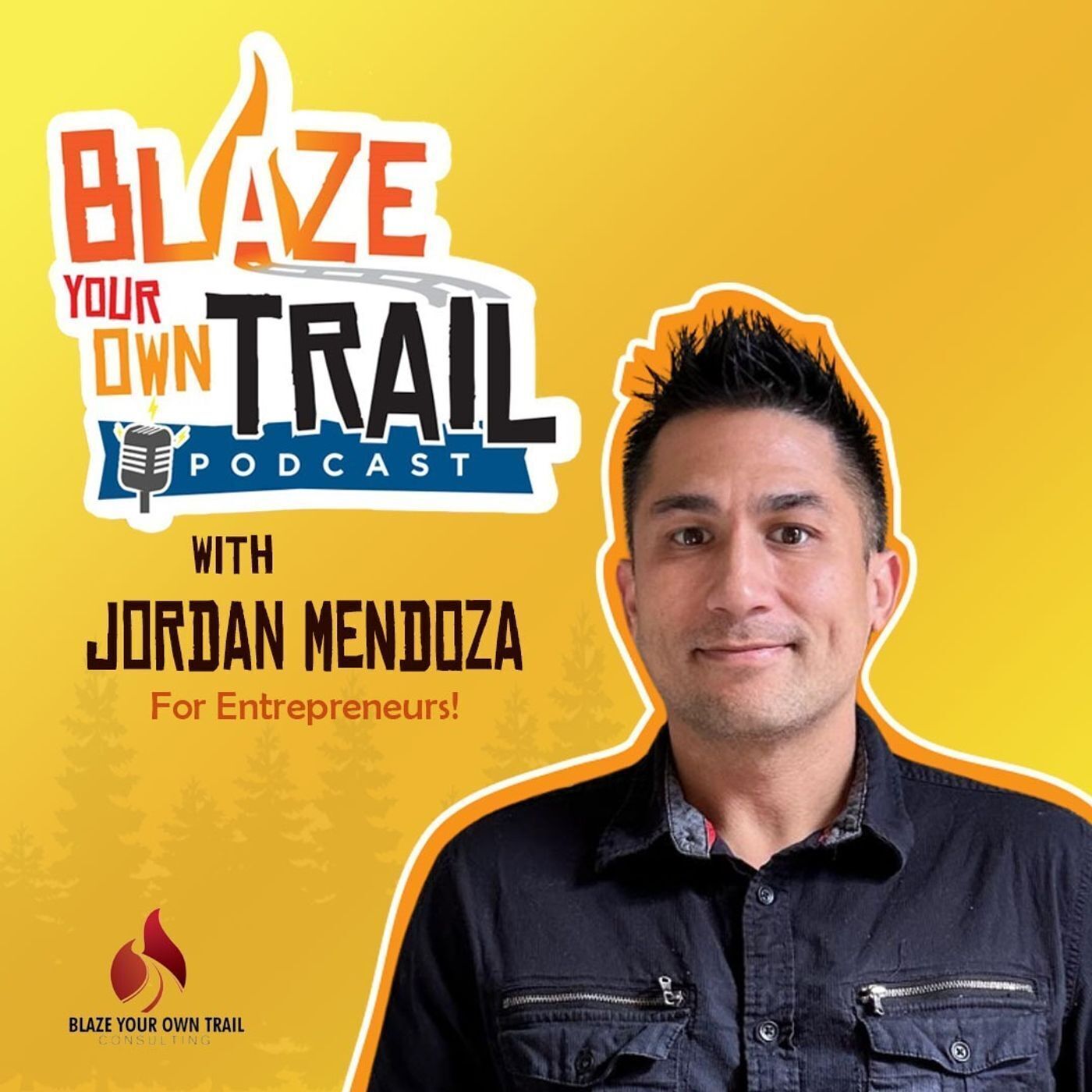

Takeaways
Get clear on your audience and their needs
Create an outline and focus on the next step
Repurpose existing content for your book
Invest in coaching and surround yourself with a supportive community
Don't let perfectionism hinder progress
Make appointments with yourself to stay accountable
Chapters
00:00 Introduction and Background
05:07 Life After High School and Discovering Speaking
07:06 Transitioning from Corporate to Entrepreneurship
09:05 Investing in Personal Growth and Development
10:59 Becoming an Author and Speaker
13:46 The Importance of Coaching and Community
19:30 Tips for Overcoming Procrastination
29:18 Becoming a Published Author
35:13 Helping Others Overcome Procrastination
Connect with Jordan:
Join Jordan's weekly Group Coaching Community Risk Free
Installing strategic sales systems & processes will stop the constant revenue rollercoaster you might be facing which is attainable through our 6 Week Blazing Business Revenue Coaching Program
Book a discovery call with Jordan now to learn more!
The Blaze Your Own Trail Podcast is powered by:
Jordan Mendoza (00:00.488)
Hello everyone and welcome to the Blaze Your Own Trail podcast. My name is Jordan Mendoza. I'm your host and I've got a very special guest today. His name is Eric Twiggs and I'm going to have him tell you a little bit about who he is and what he does today.
Eric Twiggs (00:16.845)
Yes. Hey Jordan, thank you. This is truly an honor to be on your show. So I am your procrastination prevention partner. I'm the author of the discipline of now, and I'm the host of the 30 minute hour podcast and I help entrepreneurs to beat procrastination so they can make more money, get more done and feel more confident. And I am located in Clinton, Maryland, which is in the Washington DC metro area.
Jordan Mendoza (00:45.806)
Awesome. Awesome. Appreciate you giving that context there. my family and I actually spent a decent amount of time in the DMV as they call it. So I'm familiar with where Clinton is. We lived in Bethesda, Maryland. We lived in Fairfax, Virginia. My dad lived in DC for a very long time and in Northwest DC. So yeah, I'm definitely familiar with that part of the country.
so let's, my favorite part of the show, Eric has really just taken a rewind and getting a sense into our guest story in their journey. You know, how have you blazed your own trail? And so what we want to do is really dive back to adolescent years, know, elementary, middle to high school, you know, what kind of kid were you? What's the type of stuff did you get into? Were you more into athletics or academics? I'd love to just get a sense of a little Eric and some of the things you did back then.
Eric Twiggs (01:41.239)
Yeah, so it's interesting. growing up, I was in a mixture of athletics and academics, probably more athletics, ran track. You know, I played basketball, always had an interest in sports. But so one of the things that stood out to me when I was growing up was my dad and his work ethic. Right. So he I just always saw him. He's up early. mean, you know, there was no such thing as virtual meetings.
Those days so he's just up and out so that just sent me a message that you know Hard work is critical and it wired something in me even to this day. And so the other thing is that I Found when I was growing up that I was really never a natural Right. I was never the guy that just stepped on the golf course for the first time and then hit the ball straight down the field I know people like that those type of people irritate me by the way, but that's a whole other topic but
But yeah, I so I literally, had to really work for things. You know, I had to work to get better at, mean, whether it was track, whether it was whatever I was doing, I had to apply a certain amount of effort. But I do think that really served me like to this day. So now there's certain things that come more natural to me that I feel like are my gifts. And I apply that same level of focus and effort as if it wasn't a gift. And I think it really helps me. So I think
Those are just some things, you know, as I grew up, that they just really stood out to
Jordan Mendoza (03:16.178)
Sure, sure. So what kind of lessons can you share? I'm sure you picked up a bunch, you know, being in track and, you know, doing other sports. So what are some lessons you learn from sports that you feel like have kind of helped shaped and mold you and things that you think are critical to your success?
Eric Twiggs (03:36.077)
Well, I mean, one of the things is that you can't manage what you're not measuring. So like, if you're not measuring, there's a reason we keep score, right? I mean, even if you look at track, if you're, I mean, you should really be measuring every aspect of it. If you're running track, you've got to measure, you know, what's your 100 time, what's your 200 time, what's your 40 time. And as you keep tracking it, that's where it gets better. And so like to this day, I
I'll track it if I want to improve my podcast downloads, you know, I just start tracking it. And that's really a lot of times that's the only thing I'm doing different. But all of a sudden things tend to improve because I'm now I'm paying attention, but I'm not aware that, know, there's subtle little things I'm changing when I see that the result isn't where I want it to be. So that's something. And the other thing that I picked up and this was always a big struggle for me was really clarity.
Right, I just believe that clarity is the starting point of success. And you know, some people when they arrive on a college campus, they know, yep, I wanna be a doctor. So I need to do this, I need to do that, I need to take this internship, I need to do that, need to that, that, that, that. I wasn't one of those people. I knew I wanted to get into business, but clarity was always a challenge for me. And
That's something I've really worked on in my career. Just anything I'm doing, I need to really be clear. We need to know the end from the beginning. So those are some things that come to
Jordan Mendoza (05:07.272)
That's great. great. And so let's talk about after high school. Did you end up going to college and playing sports in college, or did you take more of the academic route
Eric Twiggs (05:20.129)
Yeah, I play sports in college just because I knew in college it's just a whole different ballgame. It's, you know, sports is like a lifestyle. When I was doing it before it was more fun and that type of thing. But when you get to college, it's all, you're all in. And that's just what you're doing all day, all the time. So I didn't do sports in college, but I did have an experience in college that literally shifted me. It really got me to the point of, cause I'm always asked, you know, how did you
talking about overcoming procrastination. So it was my, it was my senior year at Hampton university. And I'm having a conversation with a good friend of mine. His name is Donnell. Now I have to admit Jordan, he and I were a little different, right? At the time he was all about his purpose and I was all about the party. So I would say, Hey man, you know, let's go. We've got this frat party. What are we doing? And he'd say, Eric, need to really get serious and think about what you want to do and be focused. And I'm
Okay, man, are you coming to the frat party with me or not? And so several weeks go by I don't talk to him But then I get a phone call from his mother out of the blue informing me that he was killed in a car
completely changed everything. It really sent me a message that maybe I don't have the time that I think to do the things that I want to do. Completely changed everything. I mean, I am different to this day. And from that moment on, I really started paying attention to what am I procrastinating? What are my priorities? How can I be the most productive person that I can possibly be? That's really where that shift started.
Jordan Mendoza (07:05.456)
Yeah, well, sorry for your loss. know losing someone close to you is never easy, but I'm definitely happy to see that you've taken the tragedy and turned it into triumph and you're helping other people, you know, not make the decision to procrastinate, but figuring out ways. And we're definitely going to get into that here as we go on to the episode. So this happens, you know, in your senior year.
you, you finish up school, you know, what goes on in your head as far as direction or what you wanted to do after
Eric Twiggs (07:42.561)
great question. So I thought the message from that was you know what, life is short, time is short, I need to climb the corporate ladder as fast as possible, I need to become successful and you know with a company and that's the message. So I did that and I got to a point where I was a district manager in automotive service.
I was pretty young to have that type of position. You know, I had 17 locations. had 500 employees. We were successful by every measure. We were winning all these awards. I'd walk in the room, literally people would be applauding. So it was just, you know, we're having a lot of success, but I remember this really plain as day and I'm driving, had BMW and all of that. One day I'm driving, I'm looking in the rear view mirror.
And I realized that the eyes that were looking back at me were the eyes of someone who hated what he was doing.
Like I was successful, but I really didn't feel significant.
So sometimes you you can be climbing this like they'll say sometimes you can be climbing You know the ladder of success and you get to the top realize you're leaning up against the ladder leaning up against the wrong building that that was totally Where I was at that
Jordan Mendoza (09:04.828)
Yeah, and I was there in corporate as well, know, having the same feelings, the same thoughts. It's like, you know, is this really where I'm supposed to be? So I'd love to know, you know, I'm sure that's a question that you asked yourself. And, you know, what was the answer you got
Eric Twiggs (09:23.081)
So it was really some time it took some time to discover that right? I knew it wasn't this right and I just I started really thinking on you know, when When did I really feel like I was lit up and I was really? Liking it it always went back to when I was speaking in front of a group Yeah, I remember I would like I was at one point before I became a district manager. I was a corporate trainer and I would after the
I remember I would always say, man, you know, there are people who actually get paid to do this all the time. Man, how cool would that be? I would really be thinking that all the time. And then finally, I started getting the feeling like, hey, you know what? I should be a motivational speaker, inspirational speaker. And then I started procrastinating because then I started thinking, wow, who's going to pay me to come talk to their group? Well, you know, who do I think I am? Les Brown, Tony Robbins, they've said everything
needs to be said on this topic. But finally, after some procrastination, I joined Toastmasters International. And so I joined Toastmasters and all of a sudden I started winning these speech competitions. Then I met someone who trained professional speakers. I took his course and literally with one event made back everything I was paying for the course based off of one idea he gave
So I took that as a sign that joined the National Speakers Association and the rest is history. And I just really just kept pursuing it from
Jordan Mendoza (10:58.778)
Yeah, that's great. Yeah. And what I really take away from this is, you you decided to invest in you, right? You decided to invest in your craft, invest in your ability to be better, right? Even though you had won some awards in corporate, you know, and a lot of that, I'm sure, was based on your ability to sell, right? The ability to communicate effectively.
Which is speaking right, but now you've kind of said hey, know what? want to I want to take the next step here and I want to actually invest in me so that I can get to the levels that you wanted to get to and you know I want everyone that's gonna listen to this or watch this, know It's so important that we invest in ourselves, you know because we're sending ourselves a message, right? We're sending ourselves a message saying I'm worth it. You know, if if I'm gonna do this I need to do
the right way and when you can get people that have been there and that have done it to show you the way, it's just gonna collapse the timeline for you. So for people that are procrastinating on investing in your business, don't make that mistake, because I've been there, know Eric's been there, and it's so much better on the other side.
Eric Twiggs (12:18.325)
Absolutely. So here's the thing though, the challenge is that what got you to that point is, let's say you're an entrepreneur, you got there by just kind of just taking the bull by the horns and making it happen and figuring it out. And you can almost think that, you know, getting help is a sign of weakness, right? But I'm struck by something that Tim Groover said. Tim Groover is Michael Jordan's, his personal coach.
Right that helped him with his workouts and everything. He said something that you know, Jordan is proof that you don't have to be bad to get better And you just have to understand that just because you're asking for help doesn't mean that you're flawed It means that you're just trying to get to the next level and there's no Coincidence that anybody that we think about okay, who's the greatest of all time? Whether it's Tom Brady or Michael Jordan or LeBron James
At some point they were under a hall of fame coach. That's not a coincidence. And you have to look at it from your business the same way. You really have to get to the next level, invest in the right coach. Spend time with a group of people who are going in the same direction as you. Find me a peak performer that doesn't have a coach, that's not a part of a team. I don't think it's possible.
for a true peak performer to not have those things in place.
Jordan Mendoza (13:45.884)
Yeah, coaches, mentors, people in your corner, let's call it community. Everybody needs that. No matter whether you're in corporate or whether you're an entrepreneur or you're thinking about being an entrepreneur, we all need people around us that are in our corner that, like Eric said, are like -minded. These people are moving in the same direction as us, which hopefully is up, not down. And it's important
surround ourselves with those kind of people because you're going to fall. You know, that's the one thing that I always guarantee my clients is, hey, you work with me, you're going to have some adversity come your way, you know, because when you're out to do good things more, it seems like more things are just trying to come right back after you. So I'd love to to learn, you know, when you first started speaking, because I know a lot of our listeners are speakers or some of them
just getting started and they want to start getting those paid speaking gigs. But I do want to kind of like shed the light on the reality of the business. So if you wouldn't mind, know, when you first got your first gig versus, you know, fast forward to today, what was the difference in revenue for your business and how many shifts did it take to get you from A to B?
Eric Twiggs (15:07.396)
So it's interesting You you think when you start speaking you're gonna be you know, zig -ziggler, right? Yeah, you're instantly gonna be out there and he makes it look so easy You know the late zig -ziggler he made it look so easy. He's out there in front of 15 ,000 people or less Brown
but it's a process. And when you first start out, you have to really be strategic and think about speaking for free, but be strategic. And really the key to really Jordan to making this work is really, again, clarity, knowing your audience. So I'll speak for free if it's somebody that's in my, if my audience is seven figure entrepreneurs.
You know, and I know that these people are going to be in the audience yet. Will I speak for that group at no charge? Absolutely. and one of the things I'll say though, is you have to think leverage as well. So you have to be thinking about, okay, what's the next step? Okay. So I get paid for the engagement. go, I talk to the people. What is the ideal outcome? Do I want them to purchase my book? Do I want them to purchase my product? Am I looking to bring on coaching clients?
And that's where I've had a lot of success as far as getting coaching clients from people who, mean, they still see you speak and that's just such a powerful authority when you're standing there speaking. even I would advise someone, even if you're saying speaking isn't your main thing, getting in front of a group can be huge. It just really amplifies your authority. And the next thing you know, they're like, how can I get
You know, do you take on clients? Do you this? Do you that? So I've gotten a lot of those opportunities that way. So that's something. just going in, if you're going in from the beginning, the best thing is to get that experience. And then over time, you'll be able to charge.
Jordan Mendoza (17:07.334)
Yes, yeah, I completely agree with that. It's all about the reps, you know, even though an engagement may not pay you something, there is a way to get an ROI out of that event. And you mentioned some really great things, whether that's, you know, negotiating to let them sell your book at a table, right, where you're going to drive revenue from there. And then if your book is dialed in the right way and it has the right call to actions and funnels, people, you know, to a back end offer, then that those
you know, minimal 20 to $30 transactions can actually build a relationship with the reader and turn that into even a higher paying client as well. So, yeah, no great ideas, Eric. And those are definitely some things that I've personally used. And really, it's about your presentation as well. You know, how are you telling a story that gets them to connect to you and to see their problem in you, right? That you're able to actually
help solve that problem because if you can achieve that, like Eric said, I mean, you've already have literally the, you have the space, you know, you have the room and you have the authority and you literally are what the folks could be potentially looking for.
Eric Twiggs (18:21.855)
Absolutely, and I would say this too is that you really have to dominate wherever you are right I'm you know and funny thing I've gotten a lot of breakthroughs from small audiences in small situate things where I where I've gone in thinking I could have easily thought goodness. This is just a waste of my time my god, I'm just gonna go ahead and just get this over with and mail it in I have learned you just never know who's in the audience
You can have five people and one of those people can give you a game -changing opportunity I mean, I've seen it so many times so literally you have to if your goal is to speak in a 20 ,000 person arena and have it full you need to visualize that while you're speaking to 10 people and Speak to those people with the same passion the same urgency you would if it was 20 ,000 and you'd be surprised they may get to the point where it's 20 ,000 one day because
that talk you're having right then and there. So I think that would be a great piece of advice for the person who's watching or listening to us to write
Jordan Mendoza (19:29.864)
No, I completely agree with that. And I've had rooms of 15 or less that have turned into multiple clients, right? Because what's nice about an intimate audience is they have access to you right there and people are going to take advantage. And the questions that they ask you and the answers that you give back going to those people. mean, that is like deep, deep connection.
And so yeah, I completely agree with that that even smaller groups, it doesn't really matter the size. What matters is your ability to navigate the room and to be able to help them in real time, which is great. let's shift a little bit into, you you're speaking at Toastmasters, you're winning awards, which is amazing. Kudos to that. And now you're picking up bigger engagements, I'm sure going from.
free to fee at some point where now there's an investment for people to bring you on and maybe you're packaging it now with other offers. So walk us through that timeline, if you will, and then how much effort and energy and what types of investments outside of Toastmasters did you have to make into yourself to help you accelerate and actually grow?
Eric Twiggs (20:46.698)
Yeah, great questions again, so I had a speech coach
who is very, I mean, he won the Toastmasters World Championship of Public Speaking and he speaks, he's all over the world. So I had a speech coach and I would literally send him my videos and it was, it's a humbling experience, Jordan, because a lot of times I, know, someone would give me some feedback on how I was speaking and I would, I don't believe that. And I'd send the video to my coach and he said, yeah, he's right. I'm like, okay.
But yet the coaching really helped and not only that being in a national speakers Association was very helpful as well Because you're in you know, I'm meeting with all these great speakers. So a quick story. So like I had There's a guy's name is dr. Willie jolly. He's a very Well -known motivational speaker. He's in the speaking Hall of Fame when I was first starting
Speaker I told my dad I wanted to be a speaker and he said you know what you need to follow this guy gave me his book and everything else this guy dr. Willie jolly so he's like my first picture of a professional speaker and so as I get to my journey I get to my first National Speakers Association meeting dr. Willie jolly's there And I'm like, my goodness. I'm we're sitting at the table We're talking and he would go on to write the forward for my book the discipline of now so it was like a
Full circle moment, but investing in in that group. I mean they just I mean he would just give me so many tips So so Eric, you know when you do an event you need to have this type of brochure Here's what you need to say. Here's what you need who you need to be targeting Because there's so many little nuances the people that are crushing it. They make it look easy But there's so much nuance to get to that next
Jordan Mendoza (22:49.276)
No, I agree with that completely. There's so much strategy that you have to build in on the front end in order to get to the offer on the back end. And I think a lot of people discount it because it does look easy. And if it looks easy, it means that the people are really good at their craft. And it also means that they've done it over and over and over again. And that's really one of the things that I've seen.
has been consistent, Eric, in your journey is you have become a practitioner of each thing that you're diving into. And I would love to get your thoughts on that. How important is it for you and the people that you work with that they become a practitioner of not procrastinating?
Eric Twiggs (23:38.409)
Absolutely. Yeah, I mean you have to take action. I mean, that's the key, but it's not just about taking action It's about taking the right actions Right because you can just be doing the wrong things you can spin your wheels Right, you can yeah, I'm working so hard. man. I'm burning them. I'm burning. I'm grinding I'm burning the candle at both ends, but are you doing the right things? And so I think Becoming a practitioner is yes. There is a required work
You have to put in the work, but you also have to know what the right work is and be taking the right steps. that's why, again, a coach comes in. They can point out to you some of those blind spots. Hey, you're doing this, but you should try that. And it helps to have someone who has done what you are attempting to do. Right. And they can tell you. I never forget. So have a coach
And for the podcast, you know, I'd been sending out invites to certain specific people in my niche to get them to be on the show and nobody was responding. Like it was just crickets. Like, what is going on here? And so I was talking to my coach. There's a reason I was talking to my coach and she was like, you know, have you considered this, this, this? You should probably say this in the message. And I did that. I added like one line to what I was saying.
Complete game changer all of sudden just about everybody I was pitching this to now. yeah, absolutely And all I changed was that one line. I could have kept working hard, right? I could have just said that to a hundred people but having the coach Again, it made me a better practitioner. So now I can communicate I can work with effort and efficiency because I'm doing the right
Jordan Mendoza (25:33.256)
Yeah, 100%. Yeah, it's just that one kind of subtle switch, right? It might not even be almost visible to the human eye. It's that small, but it can make a world of difference. And, you know, I have a buddy recently paid 75 grand for 15 minutes of someone's time. And a lot of people might say, like, that just seems like a stupid investment. And it's like, well, if that 15 minutes...
gives you that one slight tweak in your business that brings you from $50 ,000 month to $100 ,000 a month, I would say that that $75K was well worth
Eric Twiggs (26:15.021)
100 % I saw like my coach she's in mastermind groups where it's like $100 ,000 To get in this group you have to pay it. So you say why would somebody pay? Just for what you said You know to get and these are I mean again though If you can just spend $100 ,000 to get into a mastermind group, you're at a certain level But they're they're interested in getting to the next level and they know all it takes like you said is that one little tweak
that can take you from where you are to where you're trying to
Jordan Mendoza (26:45.512)
Yeah, yeah. I love when clients that I'm working with have those epiphanies. I was helping a client recently and in her, I think, third call with me, I just said, you know what? We need to do something with your pricing because it just seems too good to be true. It's too cheap. And I said, are you willing to give yourself to 50 % raise? And she said, that sounds great. Let's do that.
So she had to see the value, right? Because I said, listen, you've been doing what you're doing longer than I'm doing what I'm doing. And this is where my rates are. And when I said that to her, the light bulb kind of went off and she started to then see the value in everything that she put into it. And I got a message, a DM, and she said, hey, I was able to sell it for the $9 ,500.
How cool is that, right? When it just took me saying there's value in it, here's a scenario to look at to where she then saw it and now she just doubled her revenue. I mean, and she can do that with the next client and with the client after that. that's so that value becomes exponential.
Eric Twiggs (28:05.569)
Yeah, it's funny you say that. had a similar experience, again, with another coach I had years ago. And I had somebody reached out to me wanting me to speak with this government agency. And I was planning to charge this. I just mentioned it to my coach at the time in passing. And she's like, no, no, no. That's too low. You need to charge this. And I'm like, really? You sure? Yeah, yeah, yeah. You should charge that. I'm like, huh, OK. And I offered. They were like, So it was thousands and thousands of more dollars.
that had I not had a couch, I would have missed out on. So, yeah.
Jordan Mendoza (28:37.456)
Yep. 100%. 100%. So let's dive a little bit into the topic of becoming an author. Because I know that's a lot of people have that on their wish list or their vision board or their, you know, big hairy audacious goals. You know, it's something that a lot of people want to check off before they, you know, check out, so to speak. So I'd love for you to share a few tips, maybe
there things that you did when you decided that that was an avenue or something that you wanted to get done. But what would be maybe your top three tips on becoming a published author?
Eric Twiggs (29:17.293)
So I would say number one, get clear. Again, really get clear on who are you writing to? Really have that avatar. It should be, it's a 42 -year -old person who works at corporate America but wants to have his own business. He's got to really get that level of clarity.
Give him a name, you know, it's Eric. It's entrepreneur Eric, Eric is 42 years old. Eric wants to get from where he is now to being a full -time entrepreneur. So if you can gain that level of clarity and then you're writing exactly to Eric, what are Eric's problems? What is Eric's life like? So I think that would be one piece, really getting your avatar clear and just so that you're talking to that person because guess
Eric will raise his hand and like oh my goodness. He's talking to me and and and share the book as well I think number two for me too is it's really going about it and just having an outline as As opposed to just sitting down and just trying to start right. That's what I did wrong, right? When I first started I was gonna say I'm just start writing but as really no, okay, what's the title? You know, what are the gonna have 12 chapters? What are the 12 chapters gonna
And then you're just kind of having bullet points for each chapter. And then things evolve, you know, as you're in the midst of the writing. You may think the chapter is gonna be this, but as you filling out the bullet points, you say, man, now it's really about this. The same thing with the title. Number three is that you can take the existing content that you already have
That can really become a big part of your book. So for example, if you have a podcast, which I would encourage everybody to get a podcast. But if you have a podcast and you, you got a hundred episodes, you could pull out 12 episodes that are on a topic or theme that you're really passionate about. And there's all kinds of tools like the script and other things, but you can get it transcribed into words and then get an editor and just start, and that's your book.
Eric Twiggs (31:39.961)
That's because a lot of times we you know, we again try to sit there and look at a blinking cursor and now you've got writers block We don't really have to do that You can take advantage of the technology look at you know content you if you've been writing articles and things like that You probably have a lot of the things That would go for books. Hopefully I've answered that
Jordan Mendoza (31:59.974)
Yeah, I love it. Love those tips. Those are definitely great. you know, I'm in the process of co -authored a couple books and right now I'm actually working with a publisher and writing my first solo book. And a lot of the things that you mentioned are some of the things that we have been doing as part of the process. You know, it's you got to have that outline, you know, before before you really even put pen to paper, having that just a little bit of structure really helps
keep things organized, but like you said, there's gonna be some, there's gonna be some ebbs and some flows, and there's gonna be some changes and some shifts, but by having that table of contents, it really does help get everything, keep everything dialed in for sure. And other tips were amazing. And so I would love to really share with everybody, you know, when did the kind
main transition into what you're doing now occur. I know speaking on stages was something that you started doing, bringing in more revenue doing that and then becoming an author. So just give people a little bit of what was it for you that brought you into full -time entrepreneurship.
Eric Twiggs (33:16.311)
So just having the book and then having the podcast helped as well. And then just, I've been focusing more recently, especially after the pandemic, focusing more on like coaching. So that's really been kind of my, main thing, the coaching and the podcasts and I'll do speaking here and there, but it's challenging to establish your authority without being an author.
It's not impossible, but I'll just say it's challenging and there's other ways now with the podcasting and everything else that you can Create that authority in your space, but it is a challenge I just like I'll say like I noticed a difference from when I didn't have a book from when I had a book so and I Didn't have a book, you know, and I'm talking to somebody I'd be like, hey, you know, I could speak to your organization about XYZ When I had the book people would see it and be like, hey, did you speak
Can you speak to my organization? So they are more likely to proactively reach out to you once you have a book. But I think you have to keep it in perspective. Being an author isn't the end all be all. You have to think about, people really are gonna pay more for implementation than they are information. You have to think about that, right? Because now you have AI, you got Google, you got this.
People can get information. Right? So you really have to think about they people want help to implement. That's where coaching comes in. You if you're a consultant, that's where consulting comes in. People want to be held accountable. People want, you know, how do I really implement? I see what's in the book. I see what's on Google. So if you really kind of go into it with that, that can help you to transition. And again, being strategic as
Jordan Mendoza (35:13.072)
Love it. Love it. And so I'd love for you to share, know, everything you do is centered around helping people to not procrastinate. And so I'd love for you to just to share a few tips that might help people that are doing it today. You know, they're just procrastinating everything. They're procrastinating starting the podcast, they're procrastinating, you know, jumping into the side hustle and opening up that Etsy shop or the, you know, selling things on eBay. They're procrastinating.
they're having that cursor blinking on the book right where they're they've literally written zero word so what would your tips be for those folks
Eric Twiggs (35:52.485)
So the first tip I have is don't allow perfect to become the enemy of progress. So we always think that we have to have everything figured out before we get started. But you don't. You have to be in the military. They say you have to be able to act with imperfect information. They tell you best case scenario, you're going to
70 % of what you need to know and that's really best case scenario, but you have to be able to be someone that can act And really you have to instead of focusing on knowing everything you have to focus on what's the next step? Okay, so if I want to start a podcast, know I can't obsess and sell but the microphone to this to that the dot that I did at the platforms No, what's the next step I can take to start the podcast? Okay, the next step is I can call Jordan because I know Jordan
Is great podcaster and he can give me some tips then Jordan gives that person tips then the next steps and before you know it You are podcasting so so that that's the key thing don't allow perfect to become the enemy of progress The next piece of advice I would have for someone is to get in the habit of making appointments with yourself so if you say Yeah, I'm work on my book this week The typical thing that happens is life gets in a
Before you know it's Friday at five o 'clock. You haven't done anything to work on the book So you should say instead I'm gonna make an appointment with myself on Tuesday from 2 o 'clock to 2 to write the chapter in the book So I would say you need to when you make the appointment it needs to be the day the time and The place that you're going to do it. Is it gonna be are you gonna write the book at your home office? Is it gonna be at the cafe around the corner? Is it study show?
that when you include the place, you're 40 % more likely to follow through than if you just say, I'm gonna set the day and I'm gonna set the time. And it's gotta be literally a non -negotiable appointment that you make with yourself. So it's like, you have to think about it, if you said you're meeting your good friend at the cafe on Tuesday at 2 .30, you wouldn't just stand your good friend up, right? You would just not show up and not call, right? It's a non -negotiable
Eric Twiggs (38:15.681)
If people do those two things, they'll find like I work with clients that tell me they're chronic procrastinators and just by getting in the habit of making appointments with themselves, now they're starting to get more things
Jordan Mendoza (38:29.116)
That's great. Yeah, I know those tips are going to be so helpful for so many people. And, you know, I definitely want to give you the opportunity to share, know, what are some things that you're working on that could be helpful for folks? And if there's any programs that you're up to, feel free to share that as
Eric Twiggs (38:48.205)
Yeah, I mean the biggest thing would be listening to my podcast, the 30 minute hour. We've got every week, I'm the host, Ted Fields is my co -host. We're interviewing high achievers and they're giving specific strategies to help overcome the common business problems. And we always at the end, we have a segment at the end of the 30 minute hour that we call write this down. And we each go around, myself, the guest, Ted,
And we talk about okay based off of today's episode. What do the people need to write down so they can level up and So a lot of times that it get and that'll get you around the whole thing of I don't have all the information you'll pick up specific nuggets that you can actually log off and go and implement so that would be the best way that people can Get help as far as overcoming procrastination
start tuning in to the 30 minute hour podcast.
Jordan Mendoza (39:48.872)
Perfect. Awesome. And we'll make sure that we link that down in the show notes. Well, hey, Eric, I really appreciate you coming on the Blaze Your Own Trail podcast. Continue to blaze your own trail out there. And you're also helping other people blaze their trail through procrastination. So thank you so much again for coming on the show.
Eric Twiggs (40:08.673)
Hey, thank you for having

CEO
Eric M. Twiggs is a founding partner and president of The What Now Movement. His mission is to build high performing entrepreneurs, authors, and career professionals, who are prepared for life’s unexpected curve balls.
He is author of The Discipline of Now: 12 Practical Principles to Overcome Procrastination. The Discipline of Now has been recognized as a Global Top Ten Finalist for the 2020 Author Elite Awards in the category of Best Self Help Book. This recognition was based on the combination of the following criteria: cover design, content, popularity, and social contribution.
Eric is also the host of a weekly inspirational podcast titled "The 30 Minute Hour."
As a Certified Life & Business Coach, Eric has conducted over 28,000 coaching sessions, helping executive leaders and entrepreneurs who have moved from feeling frustrated, to finding fulfillment.
He has also led organizations of 500 or more people in corporate America, and shared his message with corporations, associations, and congregations across the country.
By reading The Discipline of Now, you will receive a proven blueprint to beat procrastination, so that you make more money, get more done, and feel more confident.
